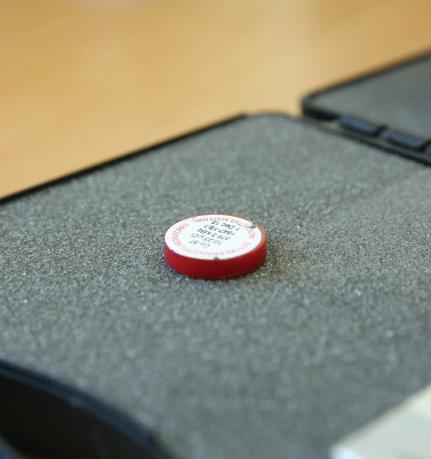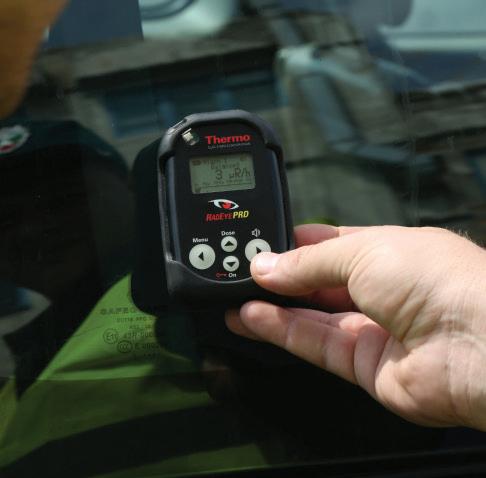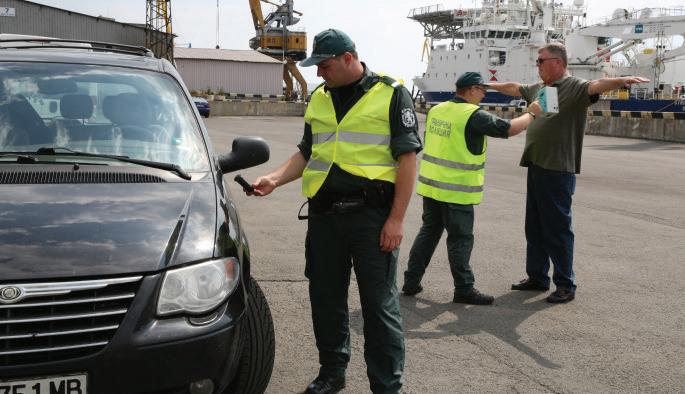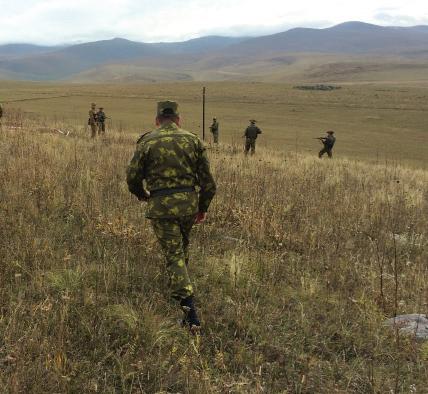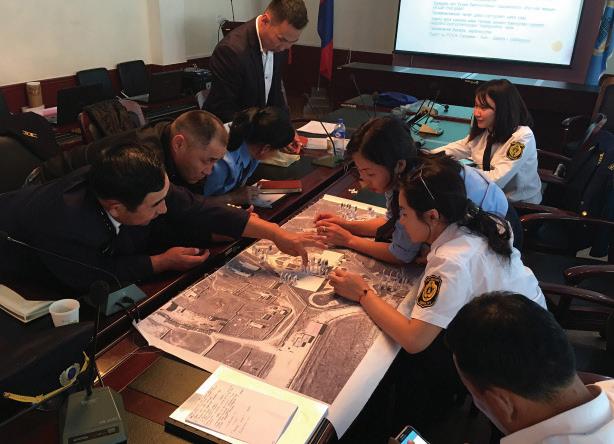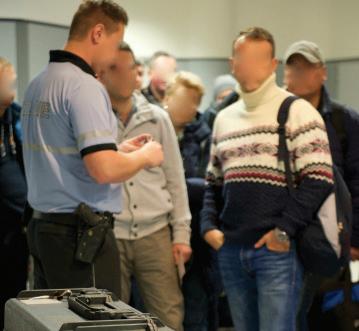
8 minute read
International Engagements
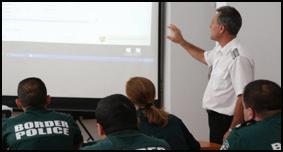
As of the end of the 2018 fiscal year, NSDD efforts had resulted in equipping 660 Border Crossing points (BCP) and deploying 167 Mobile Detection Systems (MDS).
Advertisement
NSDD also provides technical training and expert support to assist partner countries in developing the capability to assume full responsibility for the continued operation, management, and maintenance of their detection systems. As of the end of the 2018 fiscal year, moreover, NSDD has transitioned responsibility for 81 percent of deployments to its international partners.
After transferring the costs and responsibilities of sustaining radiation detection systems to partner countries agencies, NSDD continues to engage with partners to verify that systems continue to operate effectively and to track system performance. Where possible, NSDD obtains information concerning use of NSDD systems and detection events of R/N materials.
NSDD also works with partner countries on nuclear forensics activities in support of building smuggling investigation capabilities. NSDD Forensics is currently working with 20 international partner countries, and is engaging with an additional 11 non-partner countries, to improve detection and identification of radioactive and nuclear materials.
As the threat continues to evolve, NSDD continues to identify new strategies and pursue engagements with new partner countries and organizations, including in the Western Balkans, North and East Africa, the Middle East, South Asia, and South America. In cooperation with two of its most advanced partners, NSDD also began efforts to address smuggling risks on maritime and air pathways.
IMPACT
NSDD’s longstanding experience and extensive relationships developing a collaborative R/N materials detection and deterrence network increases the opportunity to influence the adoption of sound nuclear detection and forensic practices. Using this position of influence, NSDD builds and strengthens nuclear detection and forensic capabilities of partner countries which increase U.S. national security in the following ways:
Interdicting near the point where
the material was obtained.
Building detection capabilities of partner countries increases the likelihood of detection of the lost or stolen material near the point of origin, thereby reducing the risks to health and safety and preventing illicit transfers.
Interdicting material outside of the U.S. The consequences of an improvised nuclear device or radiological dispersal device (i.e., dirty bomb) being detonated would have a catastrophic physical, psychological, and economic impact. Therefore,
NSDD works with countries to develop their capabilities to detect and interdict material out of regulatory control before it arrives at U.S. borders. Building and strengthening a holistic set of nuclear detection and forensic capabilities abroad. While a major component of NSDD has been deployment of R/N detection equipment, the equipment alone is insufficient to ensure effective, long term operations. Therefore, the program also builds capabilities in complementary areas. For example, NSDD works with partner countries to develop site-level and national procedures for responding to nuclear security incidents. These efforts integrate various agencies within the country, thereby increasing the effectiveness of security operations. Moreover, through its
Training Program, NSDD teaches partner countries how to effectively train current and future staff on nuclear security awareness and detection operations.
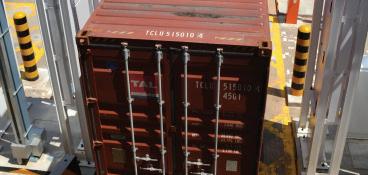
Creating regional and multi-lateral partnerships.
Because the threat of nuclear smuggling is a transnational concern, NSDD builds regional and multi-lateral partnerships among countries to improve information sharing, communication and coordination of detection and nuclear forensics operations.
Coordinating national nuclear security activities with U.S. government agencies. Leveraging its large international network and regular, on-the-ground access to partner agencies, NSDD routinely coordinates with the Department of State, Department of Homeland
Security, Department of Defense, and Federal Bureau of
Investigation, to share relevant information and coordinate activities to close existing gaps and address emerging threats.
SUCCESS STORIES
GEORGIA
NSDD’s partnership with the Government of Georgia began in 2005. Since then Georgia has become one of NSDD’s closest partners in combating nuclear smuggling. Because of Georgia’s strategic location as a transit country (in the middle of Europe and Asia) nuclear smuggling has always been a serious concern. Twenty percent of the country is under foreign occupation. In these areas black markets and criminal activities flourish, creating an even more dangerous environment conducive to the smuggling R/N materials.
NSDD’s success in Georgia is largely the result of developing strong relationships with multiple agencies and working as true partners to combat nuclear smuggling. Avoiding the donorrecipient approach NSDD has been able to influence decision makers by providing guidance and best practices to the Georgian government on effective means to implement a layered approach to radiation detection. Through this collaborative approach, NSDD has developing lasting relationships, and unprecedented access that has led to advancements in program knowledge. Through cooperation with Georgia, NSDD has been able to prove new concepts and approaches for use in other countries. These initiative have included:
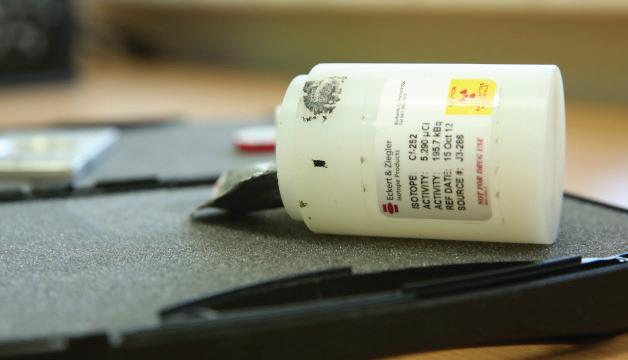
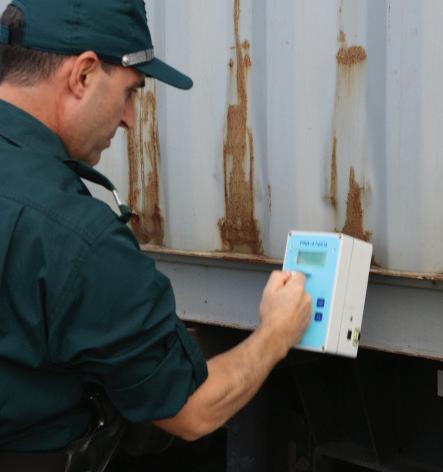
Deploying the National
Communication System connecting all radiation portal monitors at all sites into a central monitoring system;
Piloting the first NSDD-FBI training, deploying the first Mobile Detection
Systems to monitor traffic from the occupied regions of Abkhazia and
South Ossetia;
Training and equipping the Georgian Coast Guard on radiation detection techniques for use in the open seas.
The Georgian government has been quick to take ownership of NSDD-provided equipment and requested training in equipment maintenance with the intention to take on full maintenance responsibility immediately. NSDD welcomed this approach and provided key staff with maintenance and operator training. The staff trained in equipment maintenance also took on training of border patrol officers on radiation detection and went on to form their own department: the Border Technologies Department within the Operative-Technical Agency within the Ministry of Internal Affairs. The group has since joined the State Security Service and are now experts in radiation detection equipment and training and have expanded their role to include all border technologies and related activities.
Among the outcomes of these efforts are:
The State Security Service Special
Operations Department has interdicted over 20 attempts of smuggling of nuclear and radioactive material using
NSDD provided hand-held equipment and mobile detection systems;
Radiation detection systems installed at international checkpoints in Georgia has been used to stop the shipment of radioactive scrap metal and contaminated vehicles The Agency of Nuclear and Radiation Safety (ANRS) has been using NSDD provided training and equipment to identify orphaned sources throughout Georgia and is establishing a safe working environment in case of incidents.
The Ministry of Interior Special Tasks Department is now able to monitor traffic and scan for radiation at the Abkhazia and
South Ossetia administrative checkpoints using the MDS system and the Georgian Coast Guard can implement their radiation detection equipment and training in NATO exercises and operations in the Black Sea.
Overall, NSDD work in Georgia has proven successful in increasing Georgia’s border and internal security capabilities. This partnership has been integral to further global security efforts to counter nuclear smuggling. Georgia remains a critical partner to the United States Government and is a proven leader in the region committed to counter nuclear smuggling operations and sharing their best practices within the global community.
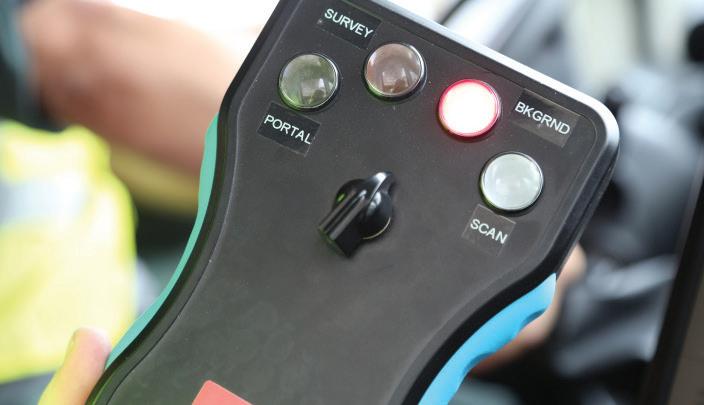
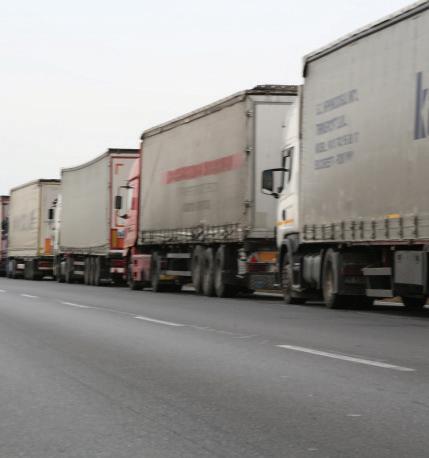
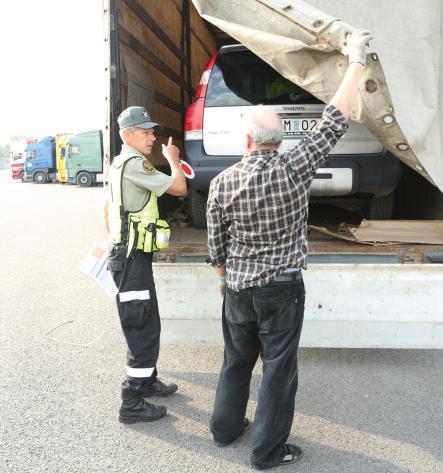
JORDAN
The Hashemite Kingdom of Jordan is strategically situated in an extremely challenging region with recent conflicts posing significant risks to border security. Reports of radioactive materials out of regulatory control in neighboring countries underscore Jordan’s unique importance to global counter nuclear smuggling efforts.
Jordan has been an NSDD partner since 2008 when the Jordan Nuclear Regulatory Commission (now the Energy and Minerals Regulatory Commission or EMRC) signed a Memorandum of Understanding with the U.S. Department of Energy to Prevent Illicit Trafficking in Nuclear and Other Radioactive Material. Since then, NSDD has worked with the EMRC to provide radiation detection equipment to a major seaport and four border crossings, in addition to providing mobile radiation detection equipment for counter nuclear smuggling efforts in the interior of the country. The Government of Jordan remains highly engaged with NSDD and the U.S. Government interagency on counter nuclear smuggling issues. This includes the development of a Joint Action Plan to create and maintain a robust nuclear security program, the development of a regulatory framework for radioactive material, standard operating procedures for interdicting material out of regulatory control, and an Integrated National Border Security Strategy that supports Jordan’s counter nuclear smuggling efforts.
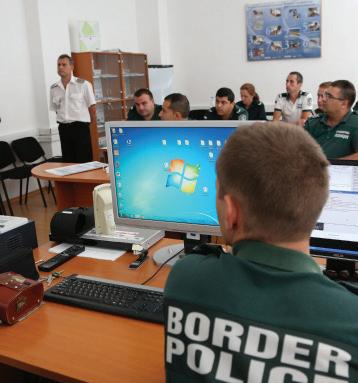
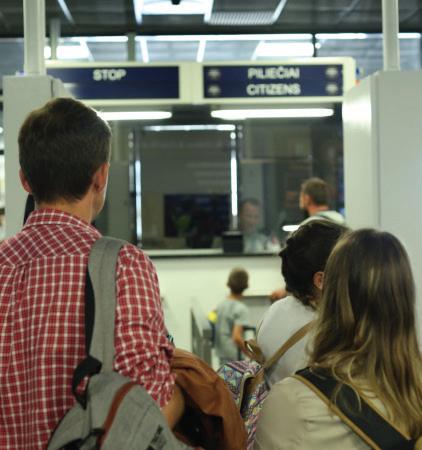
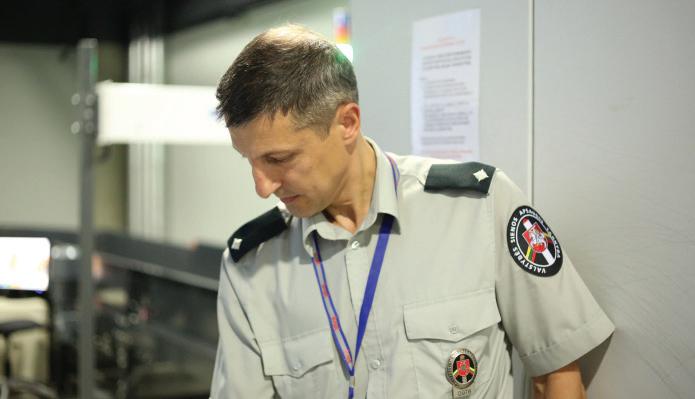
Sustained operations are the hallmark of a successful nuclear security program and Jordan demonstrates its continued commitment to the NSDD mission through robust sustainment efforts. The EMRC independently operates
and maintains the radiation detection systems, trains its own staff, responds to alarms with handheld devices, and provides technical reachback to its personnel. The EMRC also contributes its expertise to NSDD sponsored regional and international training initiatives by providing knowledgeable trainers at training events for NSDD partners from around the world.
NSDD’s partnership with Jordan to prevent, detect, and investigate smuggling of R/N and materials is an important accomplishment for the program and a critical component of its current and future endeavors in the Middle East. Jordan continues to stay at the forefront of international nuclear security engagements, committed to the development of a best in class approach to supporting counter nuclear smuggling operations and taking personal ownership of the mission.
